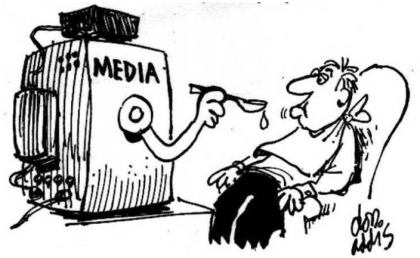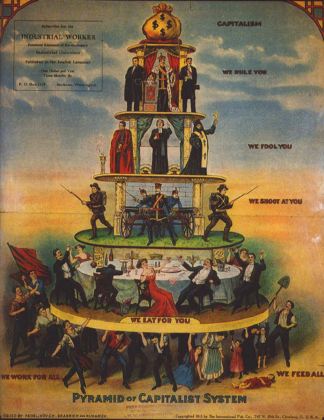
Description
MEDIA, TECHNOLOGY AND POLITICS
POLI 368
Department of Political Science
Concordia University
Summer 2017
Class Time: Mon & Wed: 6:00 – 8:15 PM
Office Hours: By Request
Professor’s Office: H-1125.12
Politics and media studies are interrelated and multifaceted topics. Newspapers, radio, TV, and the internet are some of many media forms that carry messages about political ideas, social relations and prevailing power structures. Signs and symbols can be creative and/or coercive. They can be used to educate people about world issues so that people can participate in political platforms as informed citizens; however they can also be used to misinform the public in order to manage public opinion and push a specific political agenda. A variety of political actors, such as political parties, pressure groups, people with wealth and influence, and concerned citizens everywhere use media to their advantage – some with more, others with less success.
Changes in technology have revolutionized the social, economic and political landscape. Global communication has been facilitated by the proliferation of portable communication devices and social media platforms. Internet sites, like Facebook and Twitter have allowed people to become amateur journalists and political commentators. In 2014, in Ferguson, Missouri, protesters themselves broadcast the demonstrations against police brutality allowing the world to witness their uprising; recently in Syria, civilians have been livestreaming the aftermath of the bombing campaigns and gas attacks; even the president of the U.S.A Donald Trump, has been informing citizens about policy reforms and executive orders via Twitter.
In this course, we will examine the interaction between politics and media by looking at how technological changes in communication has shaped political life. We will use a multidimensional framework considering the complex relationship between media producers, spectators, messages and technologies as well as the political and socio-economic environment from which media is produced and received.
In this course, we will address questions like: What is the key to effective media management? Who controls what gets onto the media and what gets excluded? What makes something newsworthy? Why are some issues covered and many others ignored? How does the media shape our political culture, our minds and identities as a people? What can we do to ensure, that this instrument that plays such a powerful role in the formation of our political consciousness, remains fair, and factual? How can we ensure that the media does not fall into the hands of those who are driven by selfish or vested interests?
By the end of this course, students will:
- Understand the complex inter-relationship between the media and politics and the impact of technological changes on democratic governance
- Be sensitive to the language of political deception, the use of illusion as an instrument to manufacture consent
- Understand the use of marketing, advertising, public relations, public opinion research as tools of political persuasion
- Be familiar with the ideas of the most significant theorists in this field
- Know how the news agenda is set and how media managers filter the news
- Understand the emerging role of the internet in the political electoral process
- Have explored ways to enhance the social responsibility of the media
Course Materials and Text:
Students are expected to complete ALL the designated readings and watch ALL of the assigned videos BEFORE EACH CLASS. Students are also expected to attend ALL classes, and participate in class discussions.
The required readings for this course is contained in a course-pack available at the library bookstore. Please see the course schedule below for the dates the readings are due.
The professor’s power-point lecture notes will be posted on the course site on a weekly basis before each class.
Students are required to watch at least two of the following documentary movies:
The Century of the Self (2002) – Adam Curtis
The Persuaders (2003) – Barak Goodman and Rachel Dretzin
Manufacturing Consent (1992) – Mark Achbar and Peter Wintonick
Control Room (2004) – Jehane Noujaim
Operation Hollywood (2004) – Emilio Pacull
This Film is Not Yet Rated (2006) – Kirby Dick
We are Legion: The Story of Hacktivists (2012) – Brian Knappenberger
Recommended readings: URLs and other electronic sources may be posted on the course website from time to time. Please visit the course website to get this material. These are only for interest and are not required.
Course Format
This course will consist of a variety of pedagogical styles including lectures, discussions, guest speakers, and community service learning. Students are expected to read the required text and/or watch the assigned movie before coming to class. In class, students will engage with each other through interactive activities, discussions and by talking with invited media professionals and political actors.
Course Evaluation
Exam 1 30%
Exam 2 30%
Short Paper 20%
Group Project 15%
Class Participation 5%
Letter Grade Equivalency
Your numerical grades will be converted to letter grades as follows:
A+ (93 – 100%) B+ (77 – 79%) C+ (67 – 69%) D+ (57– 59%)
A (85 – 92%) B (73 – 76%) C (63 – 66%) D (53 – 56%)
A- (80 – 84%) B- (70 – 72%) C- (60 – 62%) D- (50 – 52%)
F < 50%
Lecture Schedule: Themes and Required Readings
This is a TENTATIVE schedule and is subject to change. Be sure to consult the course website regularly to be aware of any changes.
Course schedule, Topics and Required readings:
June 28th Introduction
Nesbitt-Larking, P. (2009) Politics, Society and the Media (2nd Edition), Broadview Press. (Pages 15, 16 and 17)
July 3rd History of the Canadian Mass Media
Vipond, M. (2011) The Mass Media in Canada (4nd Edition). James Lorimer & Company. (Chapters, 1, 2 and 3)
July 5th Media Ownership and Concentration in Canada
Winseck, D. (2016) Media Ownership in Canada. In Who Owns the World’s Media, Oxford University Press. (Chapter 17)
Guest – Steve Faguy: Fagstein Blog (Media Ownership) http://blog.fagstein.com/
July 10th Media in the Political, Socio-Economic Environment
Nesbitt-Larking, P. (2009) Politics, Society and the Media (2nd Edition), Broadview Press. (Chapter 4)
Taras, D. (2015) Digital Mosaic; Media, Power and Identity in Canada, University of Toronto Press, (Chapter 1)
Guest – Ethan Cox: Ricochet, Alternative Media – https://ricochet.media/en
July 12th State and Political Regulating of the Media
Nesbitt-Larking, P. (2009) Politics, Society and the Media (2nd Edition), Broadview Press. (Chapter 6)
July 17th Mid-Term Exam
July 19th Group Project – Short Paper Due
July 24th Media Organizations
Nesbitt-Larking, P. (2009) Politics, Society and the Media (2nd Edition), Broadview Press. (Chapter 7)
Guest – Sarah Deshaines – Station Manager at CJAD
July 26th Construction and Deconstruction of Texts
Nesbitt-Larking, P. (2009) Politics, Society and the Media (2nd Edition), Broadview Press. (Chapter 9)
July 31th Media Effects – Politics of Reading
Nesbitt-Larking, P. (2009) Politics, Society and the Media (2nd Edition), Broadview Press. (Chapter 10 & 11)
Taras, D. (2015) Digital Mosaic; Media, Power and Identity in Canada, University of Toronto Press, (Chapter 4)
August 2nd Media, Technology and Privacy
Dwyer, T., (2016), Convergent Media and Privacy, Palgrave MacMillan. (Chapter 5)
Goggin, G. (2012), New Technologies and the Media, Palgrave MacMillan. (Chapter 2)
Taras, D. (2015) Digital Mosaic; Media, Power and Identity in Canada, University of Toronto Press, (Chapter 5)
Guest – Lex Gill
August 7th Group Presentations
Classroom Conduct:
The governing principle of classroom conduct is mutual respect. It is important that when others (including the professor) speak, we listen quietly and do nothing to hinder the attentiveness of anyone around us. If anyone is perceived to be hindering the ability of others to be attentive, they will be warned by the instructor. If the behavior continues, they will be asked to leave the room.
Late policy:
Late assignments will not be accepted without adequate documentation of medical or personal emergencies.
Academic Honesty:
Academic dishonesty is a serious offence and will not be tolerated. Acts of dishonesty include, but are not limited to, plagiarism. It is your responsibility to know and understand university and departmental policies. All acts of academic dishonesty will be reported. Please refer to the Undergraduate Calendar for complete details of offences and penalties: http://registrar.concordia.ca/calendar/17/17.10.html
Students with Disabilities:
Students with disabilities should register with the Office for Students with Disabilities and follow its procedures for obtaining assistance. In addition, please inform me of any special needs you have so that I can make appropriate accommodations.




